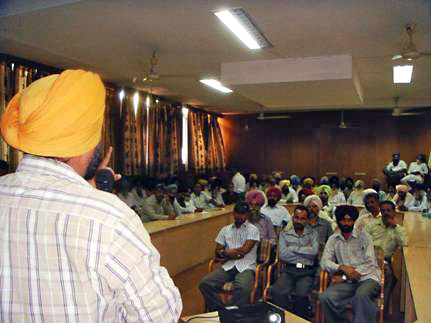Training and seminar on rice residue management
November 18, 2009
Kamaldeep Singh Sangha, joint registrar cooperative, opened the event by pointing out two negatives of burning crop residues: it increases air pollution and decreases the amount of beneficial organic material in the soil. Several agricultural scientists and extension workers then contributed additional facts about the shortcomings of the practice.
 “To
save our atmosphere and improve our air quality we must stop the
practice of burning residues,” said H.S. Sidhu, Punjab hub manager from
CSISA, adding that to increase rice-wheat system yields, at least 50% of
straw should be left on the field. With the added biomass, rice yields
increase in three to four years, and with only one tractor pass needed,
the cost of maintaining wheat fields is reduced USD 100 per hectare.
Additionally, the straw maintains soil moisture; suppresses growth of
the grass Phalaris minor; minimizes the negative aff ect on yield that
high temperatures during wheat maturity cause; and allows a rotation of
the short-duration crop saathi moong between the rice and wheat crops.
“To
save our atmosphere and improve our air quality we must stop the
practice of burning residues,” said H.S. Sidhu, Punjab hub manager from
CSISA, adding that to increase rice-wheat system yields, at least 50% of
straw should be left on the field. With the added biomass, rice yields
increase in three to four years, and with only one tractor pass needed,
the cost of maintaining wheat fields is reduced USD 100 per hectare.
Additionally, the straw maintains soil moisture; suppresses growth of
the grass Phalaris minor; minimizes the negative aff ect on yield that
high temperatures during wheat maturity cause; and allows a rotation of
the short-duration crop saathi moong between the rice and wheat crops.Sidhu then introduced participants to residue-friendly seeding machinery, such as the Turbo Happy Seeder. In one pass this machine uses direct drilling into a combine-harvested field and allows farmers to plant wheat immediately after their rice harvest, eliminating the eight to nine days of lag common when sowing under conventional practices.
Only five participants said they had known about the Turbo Happy Seeder before the course, but those who had seemed satisfi ed. “After a year with straw-managed fields and using the Turbo Happy Seeder, my rice crop was in bett er condition than those that were managed with burnt residues,” said Praduman Singh from the village Nagar, one of the five. By the end of the course, 22 co-operative farming societies expressed interest in purchasing one of the machines so that their member farmers could experiment with new technology.
“A farmer-led initiative like this that is demand-driven, contemporary, and organized to solve a specific problem is part of a revolutionary shift in Indian agriculture,” said Raj Gupta, CIMMYT South Asian coordinator, delivery and adaption cereal technology.
The course also highlighted fertilizer application and irrigation management. Toward the end, course leaders answered any final questions and distributed contact details for Turbo Happy Seeder manufacturers. Course participants included local agriculture development officers and farmers from the districts of Amritsar, Jallandhar, Kapurthala, Hosiarpur, and Gurdaspur.

No comments:
Post a Comment